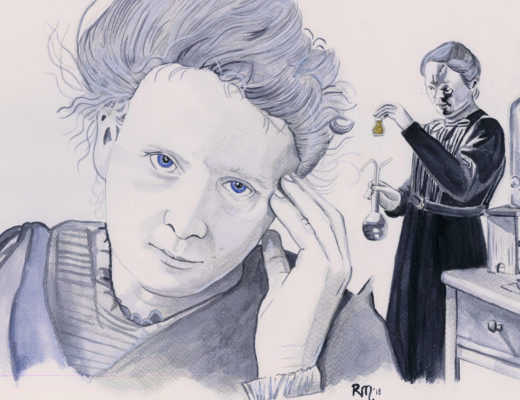Illustration by Catarina Moreno ([email protected])
How do you go from academic researcher to patent attorney? Research shows that having a PhD in a STEM field opens endless career opportunities, yet there’s a rather persistent myth within the academic community that once an academic, always an academic. Not so.
We recently had the pleasure of interviewing Dr Birgit Verbeure (see video below), a patent attorney who started off her career as a medical chemist. She followed the traditional academic path – doing a PhD and then a postdoc- until she decided to take the leap and pursue a career in patent law.
Verbeure first learned about patent law from colleagues at the University of Leuven. The idea matured during her postdoc at the MRC Laboratory of Molecular Biology in Cambridge, UK. She found the career quite interesting and decided to apply for positions that offered training in patent law. After a few years “learning law on the job” as a trainee both at a patent firm and in-house, she sat the qualifying exams and officially became an European patent attorney. Since then, she has worked as a patent attorney for several companies, and she is currently Director at the Intellectual Property department of Galapagos, an European biotechnology company in Mechelen, Belgium.
A patent is a type of intellectual property right that protects an invention- from an idea to a new drug to treat disease. The owner of a patent has the legal right to limit other people from using or selling that invention, but in exchange for these exclusive rights, they must make the invention public.
For example, in biotechnology or pharmaceutical companies scientists aim to develop new drugs to treat disease, and those are the inventions that need to be protected in order to be commercialised. A patent attorney works closely with the researchers to identify the novelty of the new drugs, then examines the feasibility of obtaining a patent, writes the patent application and finally follows up the legal side of things until the patent is published.
There are various types of careers in patent law, and although having a PhD isn’t mandatory, a science background is typically required, but this may depend on the country.
In the video interview, Verbeure gives us an insight into her job as a patent attorney and explains how she transitioned from academia to her new career. She also tells us how her research background is immensely helpful for various aspects of her job, and how much she enjoys helping scientists to identify the value of innovation in their research.
To learn more about Birgit Verbeure’s STEM career in patent law you can watch the interview in our YouTube channel. And please don’t forget to subscribe! And if you enjoyed this video, go check our interview with Teresa Niccoli, a fruit fly researcher studying Alzheimer’s.




